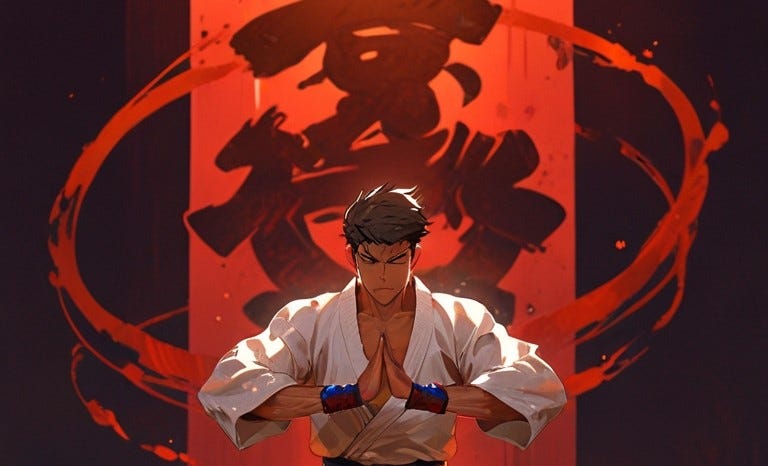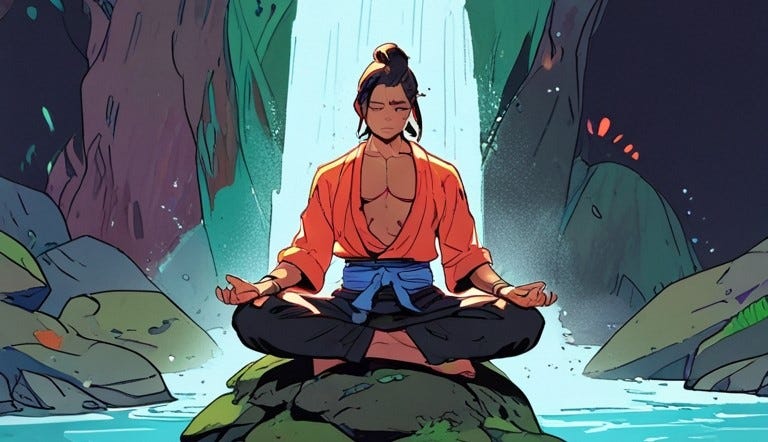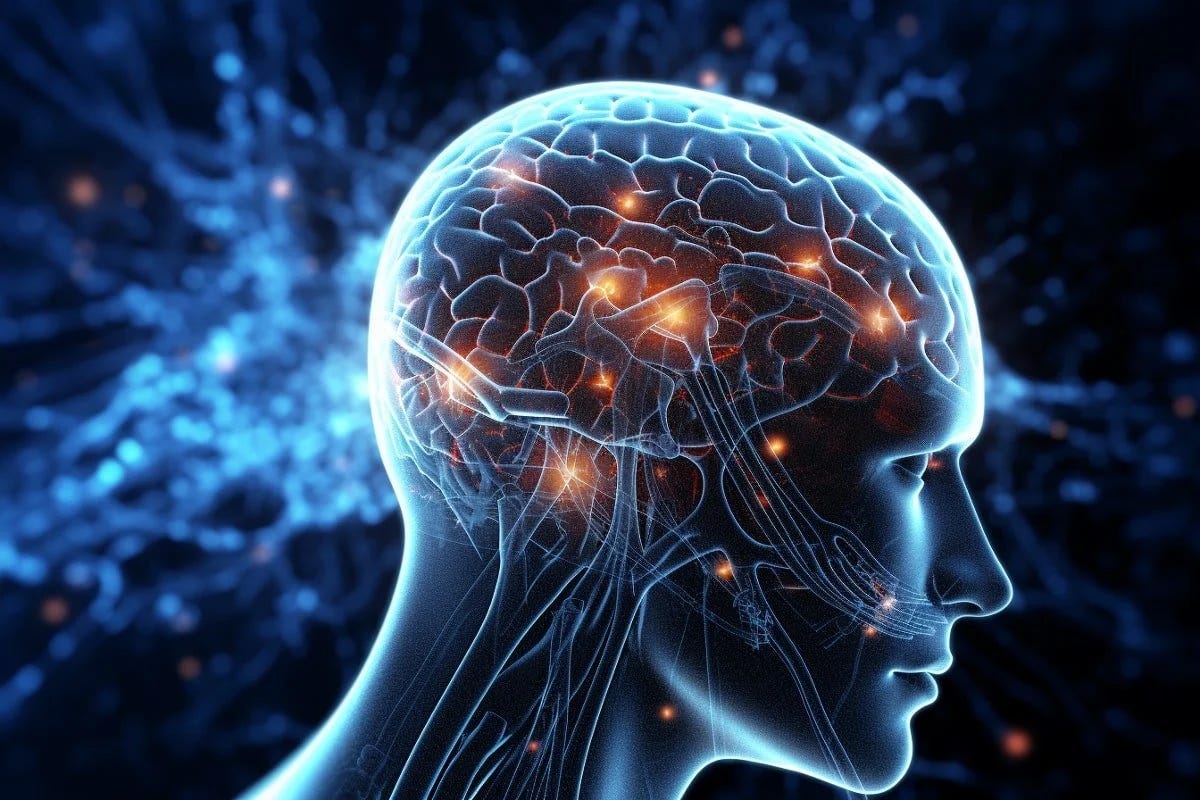There are many detrimental habits that can weaken the spirit of a warrior, but today I want to highlight one in particular: the habit of relying solely on a particular type of external motivation.
External motivation is a natural part of being human and comes in various forms—approval, validation, admiration from someone you hold in high regard, applause from a group, praise, or even fear of losing all these. It can also come from a movie, an inspiring book, or any external source of encouragement.
In many situations, external motivation plays a crucial role. It can open our minds, push us to act, help us out of a difficult phase, and inspire us to move forward. These are all positive elements in our lives because, at the end of the day, we are emotional beings as well. As I discussed in this article, it's important to maintain a healthy balance between external and internal motivation.
In this particular article, however, I want to focus on a specific kind of external motivation, which is an unhealthy form of social approval. This type of motivation, while helpful in moderation, can easily turn into an addiction. When this happens, it becomes a weakness that undermines the warrior spirit, sometimes to the point of complete destruction. I will call it, “handing over the reins of one’s life to someone else”.
I will explain this idea in two parts. First, I’ll address it from a philosophical and psychological standpoint. Then, I’ll explore the effects from a neuroscience and cognitive behavioral psychology perspective, drawing on studies that reveal how addiction to this specific kind of social approval impacts the brain.
Part1:
The more one hands over the reins of their will to someone else, the more they feed their inferiority complex. As this complex grows, the flame of their warrior spirit weakens.
When discussing the habit of over-relying on external motivation, we can draw connections to the psychological concepts of the Oedipus and Electra complexes. These theories, introduced by Freud, explore a child’s unconscious attachment to the parent of the opposite sex, and the subsequent rivalry with the same-sex parent. While these complexes are traditionally understood as part of early childhood development, they offer valuable insight into how unresolved emotional dependencies can influence our relationships with external validation as adults. Furthermore, while I don’t fully agree with Freud’s interpretation of this complex, I do believe there is significant truth to this internal dynamic that we all experience in one way or another.
In both the Oedipus and Electra complexes, the child's identity is deeply intertwined with the approval and affection of their parents. This dynamic often sets the stage for individuals to seek approval and validation outside themselves, as their sense of worth becomes externally defined. As adults, if these psychological patterns are not properly resolved, individuals may continue seeking authority figures or social approval to validate their actions and self-worth. The unresolved need for external validation can mirror the child's early dependency on their parent’s affection. This is where the line blurs between healthy motivation and unhealthy dependence, as individuals become trapped in a cycle of needing external reinforcement to feel adequate.
The same dynamic can be seen when the “warrior spirit” is weakened. Just as those with unresolved Oedipal or Electra complexes may remain psychologically dependent on external authority figures, those who rely excessively on external validation from others begin to lose touch with their own inner fire. The warrior, once guided by their own internal values, now seeks validation outside, surrendering their autonomy. This surrender mirrors the child who remains entangled in the web of parental approval, unable to fully emerge as an independent individual. When individuals constantly seek external approval, they unknowingly allow others to dictate their choices, much like the child who is still bound by the desire to please their parent. This dynamic can erode the very core of the warrior spirit—one’s self-reliance and inner strength.
Philosophically, this also speaks to a deeper issue of self-identity. By constantly seeking external validation, the individual becomes an “actor” rather than the “author” of their life. They adopt roles and behaviors based on what they think will be most pleasing or admirable to others, rather than living authentically. In this way, they initiate an internal split between their true self and the self they project outward, much like the psychological split seen in the Oedipus and Electra complexes. This divide can further weaken the individual’s resolve, as they begin to doubt their inner calling and rely more heavily on the approval of others to feel secure.
I will share some examples I have witnessed, to illustrate this further
In many cases, individuals who fall prey to pseudo-gurus or abusive, arrogant sensei-s are seeking direction and meaning in life. These so-called leaders, often driven by megalomaniac complexes, present themselves as all-knowing figures, feeding off the admiration and dependence of their followers. Instead of cultivating real growth or independence, they cultivate an environment where the follower’s self-worth is entirely dependent on their approval.
These leaders manipulate the natural human desire for guidance, turning it into an unhealthy addiction to their authority. The follower is conditioned to believe that their strength, wisdom, and purpose come exclusively from the leader’s teachings. Any deviation from the leader’s will is seen as a threat to their path of growth, making them terrified of losing the consideration of their “sensei”. What begins as a simple quest for self-improvement or training is a certain discipline, gradually turns into psychological servitude, where the individual cannot take a single step without the leader’s approval or validation.
From personal experience, I’ve witnessed how cult leaders subtly condition individuals to rely on their praise and recognition to feel like warriors, inspired agents of change, or noble fighters for a higher cause. In the cult I witnessed, followers were told (mostly indirectly) that their worth, their very essence as warriors, was tied to the leader’s validation.
Initially, the leader would shower them with praise, making them feel special, as though they were part of an elite group destined to make the world a better place. Over time, however, this praise became conditional. The leader would create arbitrary standards, deciding who was "worthy" and who wasn’t based on their whims. If someone failed to meet these standards, they would be emotionally cast aside, spiraling into self-doubt and despair.
Followers placed their entire sense of self and ability to spark their inner flame in the hands of the cult leader. Without the leader’s approval, they felt lost, demotivated, and powerless. This dependence led them to engage in increasingly extreme behaviors to regain the leader’s favor, thinking that only by meeting these ever-changing demands could they feel worthy or powerful again. They had, unknowingly, surrendered their autonomy and internal motivation, becoming mere extensions of the leader’s ego.
The solution lies in the ancient rites of passage.
Throughout history, many ancient warrior cultures understood the importance of breaking free from the dependence on external validation, and they incorporated Rites of Passage or Initiation ceremonies to achieve this. These initiation rituals, found in Native American tribes, the Spartans, the Samurai, and other warrior traditions, were designed to spark the inner fire of the warrior and symbolically sever the ties of validation from fatherly or authoritative figures. For example, in many Native American tribes, young men would undergo vision quests or isolation in the wilderness, where they faced their deepest fears alone, emerging with a newfound sense of inner strength and purpose.
Similarly, Spartan boys were removed from their homes and placed in the Agoge, a rigorous training system where they were cut off from the comforts and validation of family. Through extreme physical and psychological tests, they were forged into warriors who drew their strength from within, not from the approval of their elders.
These rites of passage were symbolic acts that helped young warriors "cut their psychological umbilical cord"—disconnecting from the external motivations provided by their mentors or fathers.
The Myth of Zeus and Cronus
This symbolic break can also be seen in the myth of Zeus slaying his father Cronus, which serves as a powerful metaphor for the psychological journey of a warrior. In this context, the killing of the father is not a literal act of violence, but rather the breaking of dependency on external authority. In these ancient rites, the warrior did not destroy the figure who trained them, but they symbolically "killed" the psychological projection of dependency on their mentor’s validation.
The test of a good teacher is not how many questions he can ask his pupils that they will answer readily, but how many questions he inspires them to ask him which he finds it hard to answer.
This act marks the moment when the student steps into their own power and begins the true path toward mastery. Just as Zeus’ act of slaying Cronus represents the birth of new order and autonomy, the initiation of the warrior marks the moment when they no longer need to rely only on external motivation to drive their spirit. The psychological umbilical cord is severed, and the warrior’s flame burns from within, balanced by both the wisdom gained from their mentor and the internal drive that now fuels their path.
It is at this point that the warrior fully steps into their own identity, no longer a student but a master in their own right, their spirit alive and burning with newfound vigor. The true warrior emerges, not only trained in body but empowered in soul, with a fire that is self-sustaining and unshakable.
“When the student is ready the teacher will appear. When the student is truly ready... The teacher will Disappear.”
― Tao Te Ching
Part 2: A Neuroscientific Perspective
From a neuroscientific perspective, the habit of relying solely on external motivation can have a profound effect on our brain's neural plasticity, limiting our ability to generate self-sustaining internal motivation. In simple terms, neural plasticity refers to the brain's ability to change and reorganize itself in response to experiences, forming new neural connections.
When we become over-dependent on external validation, our brains adapt to this pattern by reinforcing circuits that respond to external stimuli rather than internal sources of drive. Over time, this reliance weakens the brain's ability to produce critical neurotransmitters associated with intrinsic motivation, such as dopamine, serotonin, and endorphins, on its own. These neurotransmitters play essential roles in the brain’s reward system.
Dopamine, for instance, is often referred to as the "motivation molecule" because it drives goal-directed behavior and a sense of accomplishment. Serotonin is linked to feelings of well-being and contentment, while endorphins help us manage pain and stress. When the brain becomes conditioned to seek these chemicals only through external validation, it diminishes its capacity to produce them independently, making it harder to feel motivated or fulfilled without external praise or approval.
Studies in neuroscience have shown that individuals who are overly dependent on external rewards show reduced activation in the brain's prefrontal cortex, the region responsible for self-regulation, decision-making, and goal-oriented behavior. For instance, many research from various institutions has demonstrated that excessive reliance on external rewards weakens the brain's intrinsic reward system, causing individuals to experience a loss of internal drive over time.
This can lead to a cycle of emotional and psychological dependence on external validation, where the brain's reward system becomes less responsive to internal sources of motivation and increasingly reliant on external stimuli to feel any sense of satisfaction or achievement. Over time, this can erode a person’s sense of autonomy, making them less likely to initiate tasks, pursue goals, or find meaning without someone else's approval. This condition is sometimes referred to as "learned helplessness," where the individual feels incapable of acting unless guided by external forces.
To conclude
The good news is that, just as the brain can be conditioned to rely on external motivation, it can also be retrained to generate internal motivation through positive changes in neural plasticity. Severing the psychological “umbilical cord” that makes someone become over-dependent to external validation allows the brain to recalibrate its reward system, strengthening circuits related to self-determination, purpose, and autonomy.
As individuals begin to cultivate internal sources of motivation—by setting personal goals, engaging in mindfulness practices, or developing self-discipline—the brain's neurochemical balance shifts. Dopamine and other neurotransmitters associated with self-reward become more readily available, leading to an increased sense of self-fulfillment, confidence, and drive.
In conclusion, whether from a philosophical perspective, where cutting the psychological ties to external validation empowers the warrior spirit, or from a neuroscientific perspective, where this shift causes positive changes in neural plasticity, the result is the same:
People regain control over the reins of their motivation, transforming into self-reliant and internally driven beings, forces of nature in the truest sense, capable of achieving remarkable feats through their intellect and will.
➡️ PS: If you liked reading this, feel free to click the ❤️ button on this post, so more people can discover it on Substack 🙏
📌 𝙏𝙝𝙞𝙨 𝙥𝙖𝙜𝙚 𝙝𝙖𝙨 𝙖 𝙢𝙞𝙨𝙨𝙞𝙤𝙣.
We are dedicating our lives to develop practical psychological and philosophical methods to integrate the Way of the Warrior in people’s daily lives.
But this cause can do more, and for that we need your support.
Your contribution can help us dedicate more time and resources to do more research, and share more work with people who need to delve more into the Way of the Warrior.
If this resonates with you, I invite you to support our cause on Substack by becoming a contributor. 🙏⬇️
🔻📕Additional Resources:
If you've found the philosophy of the warrior spirit inspiring and want to delve deeper into this subject, I recommend checking out my book, "100 Thoughts for the Inner Warrior."
Whether you're seeking personal growth, to fortify your inner strength and mental resilience, or simply a deeper understanding of the warrior ethos, "100 Thoughts for the Inner Warrior" is a valuable resource that can guide you on your journey. You can find more information about the book and how to get your Paperback or Kindle copy here, and if you like the Hardcover version, you can get it here.
👉 Furthermore, you can consider joining my WhatsApp channel via this link if you don’t want to miss future updates.
Keep your inner fire burning! 🔥🙏








Excellent piece, it reminded me of how I was growing up - I always looked for external validation from others, and I carried this over into my adult life. I am now slowly starting to sever this 'umbilical cord' as you mention.
I wrote a similar article on the same topic: https://stefanomiele97.substack.com/p/if-you-live-for-the-cheers-youll
I enjoyed reading this, I may have to buy the book!
Thanks for writing.
What a deeply thought out and informed article! I cant agree more with all the points and references you have made. I was very fortunate to have been born in Kenya on a remote farm amongst the Masai and grew up with my black warrior brothers and was pretty much a part of their coming of age rituals (didnt have my foreskin chopped off, though, he he) More over, my father in all his wisdom drilled this one thing into me from an early age." Dont look for your confidence in the eyes of others"